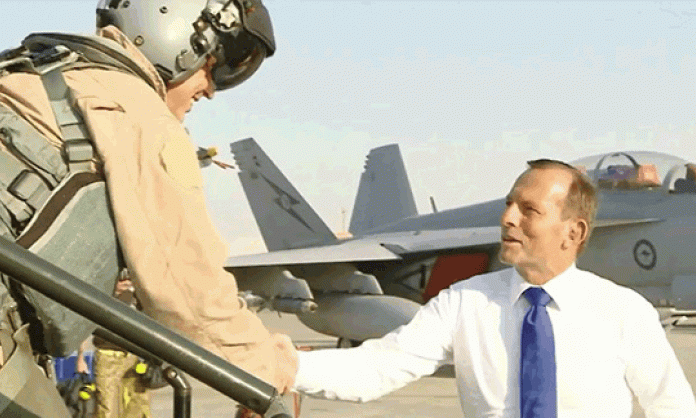After the revelation that the government was demanding an “announceable” national security measure every week between now and the election, reports in the Fairfax press that the US “request” for Australia to expand its bombing campaign against ISIS to Syria was in fact driven by the prime minister’s office surprised no one.
The Lowy Institute’s Rodger Shanahan, a former army officer, told Fairfax’s Adam Gartrell: “It’s not going to have any real operational impact given the weight of sorties that we will be able to bring to bear. So if it’s not operationally significant, the question is ‘Why do it?’
“There must be a political reason for doing it, best known only to the government.”
Even Peter Jennings of the Australian Strategic Policy Institute, who backs bombing Syria (with the gobsmacking caveat that he would like to see some “effort to define a coherent plan”), conceded: “Yeah, surprise, surprise, politicians do make political points – both in government and opposition”.
It is a sign of the depths of cynicism to which Australian politics has sunk that there is so little outrage about Abbott ordering a bombing campaign in Syria for the sole purpose of saving his own political skin. That, it seems, is just what politicians do now.
The government case for bombing Syria is so wracked with contradictions that you can’t avoid the impression that it is not even trying to convince anyone – except that part of the Liberal Party base who think anything that involves bombing Muslim countries must be a good idea.
When defence minister Kevin Andrews was asked on the ABC’s Insiders program about what would happen if the coalition did in fact expel ISIS from Syria, he responded: “That’s a complex question beyond what we are considering at the present time”.
Since the overthrow of Saddam Hussein worked out so well, there isn’t really any need to think about what happens after you have vanquished your enemy.
In Syria, the situation is even more farcical because a war against ISIS in effect means standing alongside the Assad regime and its Iranian and Russian backers. Julie Bishop confirmed this to Fairfax in August, saying: “If the Australian government agrees to the US request to expand its air combat operations against Daesh [ISIS] into Syria, the government would consult with a number of other nations including Iran”.
Whatever the many crimes of ISIS in Syria, the simple reality is that Assad’s forces have inflicted many times more horrors on the Syrian people than ISIS could ever dream of.
Every week brings new examples of how far Assad will go to defend his rule. On 16 August, 117 people were killed when regime forces repeatedly bombed a marketplace in rebel-held Douma. The following weekend, renewed shelling of the town killed 34 more, including 12 children.
As Peter Bouckaert put it: “Douma seems destined to become yet another grim marker in a conflict drowning in so many grim markers that even those who follow it closely have trouble remembering them all”.
This is the regime Abbott is aligning with if he sends Australian fighter jets on bombing raids into Syria. But maybe a short-lived boost in the polls will help him sleep at night.





